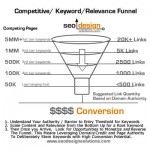Each keyword online has a tipping point from the standpoint of SEO. If you identify what that tipping point is, you can replicate or surpass it to acquire a top ranking position. But first, you have to know which metrics are important before you can exceed those variables holistically. Today’s topic is what is the keyword/content/link tipping point and how do you get past it?
Search engine optimization (also known as SEO) implies streamlining your content to be more conducive to what search engines reward. Put simply, SEO is about delivering relevant content to users while communicating what the original intent of your document is and how it works in tandem with the entire collection of documents (your website) to establish themed continuity on a topic or series of related topics.
Keep in mind that 50% of what sticks as a definition (regarding on page SEO) is entirely up to you. For example, search engines do not force you to title your content appropriately, build relevant internal links or reinforce topical relevance through layering related themed or synonymous segments. But if you do implement these fundamental SEO ranking factors, then you can rank higher will less effort as a result of achieving a higher relevance score for each page.
It is through using unique/relevant content on the page, titles, meta data and links that bake relevance right into the recipe so that when it bakes over time (1-6 months) it either acquires a ranking objective as a result of communicating superior intent and relevance by design or is augmented through attracting traffic or links to propel or cycle that content into a higher degree of engagement which is a valid metric for search engines.
Search engines equate links as “votes” and engagement / browser time as “buzz” algorithmically, either will get you a higher relevance score for the subject. The key is to strategically have a plan for the page, is it a primary landing page? Or is it created as a second tier supportive page, designed to hand its authority over to the ultimate ranking objective?
We know from experience that the more documents / pages you have to work with “to sculpt” the more trust you can develop and gain on a topical level. This topical continuity through layering your content with specific “pieces of the puzzle” to the entire segment / silo allow you to literally target hundreds of keywords simultaneously while still managing to acquire competitive primary and short-tail keyword in addition to keywords stemming (i.e. from 10 keywords into 100) which naturally occurs by default when synonymous themes overlap.
Using LSA (latent semantic analysis), intelligent use of singular, plural and synonymous keywords in the title and meta description and building the referential / reciprocal internal links to communicate through co-occurrence which keywords are assigned to what pages assist in sculpting the reputation and impression that page will make in a search engine index.
Each metric you synchronize algorithmically diffuses one less penalty and through consistency (relevant content, relevant internal links, the proper number of authoritative and deep links as well as what pecking order the pages have I the hierarchy (as a result of link flow or prominence) allow you to groom your pages for specific or targeted rankings / queries.
Looking further into the symmetry behind on page and off page SEO, another area where each webmaster clearly has an advantage is to utilize competitive analysis and the concentration of theme density a competitor has to determine just how difficult it would be to outrank them for the same keywords and assign a time line as well.
Competitive analysis allows us to determine which pages are prominent in their website by finding out if their catch all page “the homepage is ranking for the keyword” or if it’s a “specific page ranking for the specific keyword”. As a result of the latter, we can then parse and reverse engineer to a great extent the metric they used to topple the keywords relevance threshold in the index and use the appropriate on page and off page strategy.
Each keyword has a tipping point, you just have to find it. This can be determined by the degree of content, links and internal links you have within the website targeting the phrase as well as the amount of time and trust the website has to be considered as an authority in segment.
A ranking that exceeds the tipping point will remain unless challenged by another document or website, so, if you are constantly providing search engines with exceptional content, use consistent naming conventions, employ a solid site architecture, and promote it (to attract deep links and authoritative links from others) then acquiring any keyword is just a matter of time, effort and measurement to exceed the metrics of the top ranking contender.
We will get into specific tactics and techniques on a follow up post, so make sure to stay tuned for part II of this discussion at SEO Design Solutions.











